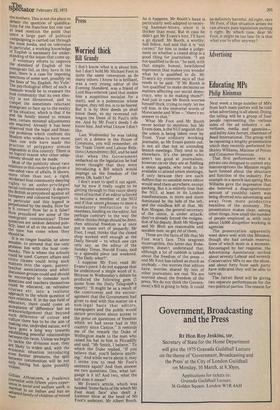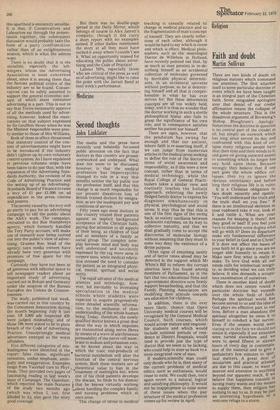Advertising
Educating MPs
Philip Kleinman
Next week a large number of MPs from both main parties will be told .what advertising is all about. Doing the telling will be a group of four people representing the various sides of the ad industry – advertisers, media and agencies— and led by Alex Jarratt, chairman of Reed International. The group will be repeating a lengthy presentation which they recently performed for Shirley Williams, Minister of Prices and Consumer Protection.
That first performance was a private one designed to correct any misconceptions the Minister might have formed about the structure and function of the industry. For example in a speech last spring Mrs Williams gave the impression that she believed a disproportionate amount of youthful talent was being diverted into advertising and away from more productive branches of the economy. The presentation makes clear, among other things, how small the number of people employed is, with only about 14,000 altogether working in agencies. The presentation apparently went down well with the Minister, though she had certain reservations of which more in a moment. Encouraged by her response, the Advertising Association invited about seventy Labour and seventy Conservative MPs to see the show, and about forty from each party have indicated they will be able to turn up.
The Jarratt Band will be giving two separate performances for the two political parties. The reason for this apartheid is eminently sensible. It is that, if Conservatives and Labourites sat through the presentation together, the subsequent discussion would probably take the form of a party confrontation rather than of an enlightenment session, which is what the admen want.
There is no doubt that it is the socialists, especially the leftwingers, whom the Advertising Association is most concerned about, since it is among them that the fiercest political critics of the industry are to be found. Conservatives can be safely assumed to support the general economic pattern of which mass consumer advertising is a part. This is not to say that Tories necessarily approve of all the methods used by advertising, however. Indeed the reservations on that subject expressed by Sir Geoffrey Howe when he was the Minister responsible were pretty similar to those of Mrs Williams.
Both of them in effect threatened that statutory control of the content of advertisements might have to be introduced if the industry didn't tighten up its own voluntary control system. As I have explained in previous columns steps have been taken to do just that, with the expansion of the Advertising Standards Authority, the revision of its Code of Advertising Practice and the setting up of an AdvertisingStandards Board of Finance to raise a levy of El per £1,000 on ad expenditure in the press, cinema and posters.
The money raised by the levy will go partly to pay for an advertising campaign to tell the public about the ASA's work. The campaign, entrusted to the Roe Humphreys agency, which formerly handled the Tory Party account, will make use of research now being carried out into the public's view of advertising. Graeme Roe, head of the agency, says media owners have already been very generous with promises of free space for the campaign.
Curiously they have not been at all generous with editorial space to tell newspaper readers about an important study of advertising carried out in Britain and Germany under the auspices of the Bureau Europeen des Unions de Consommateurs.
The study, published last week, was carried out in this country by the Consumers Association during the month beginning July 8 last year. Of 3,000 ads inspected 430 were judged misleading, and of those 198 were stated to be in plain breach of the Code of Advertising Practice. Unsurprisingly medical advertisers emerged as the worst offenders.
Five different categories of misleadingness were identified in the • report: false claims, significant omissions, undue emphasis, ambiguity and exaggeration. Examples range from Vauxhall cars to Phyllosan. They provided two pages of fascinating reading in last week's issue of Campaign. The Guardian, which reported the main features of the study two months ago (which was when 1, too, first alluded to it), also gave the story good coverage.
But there was no double-page spread in the Daily Mirror, which belongs of course to Alex Jarrett's company, though it did carry a short report with no examples named. If other dailies mentioned the story at all they must have tucked it away where I couldn't See it. What an opportunity missed for educating the public about advertising and the Code of Practice!
Labour MPs, especially those who are critical of the press as well as of advertising, might like to raise the point with the Jarratt Band at next week's performance.



































 Previous page
Previous page